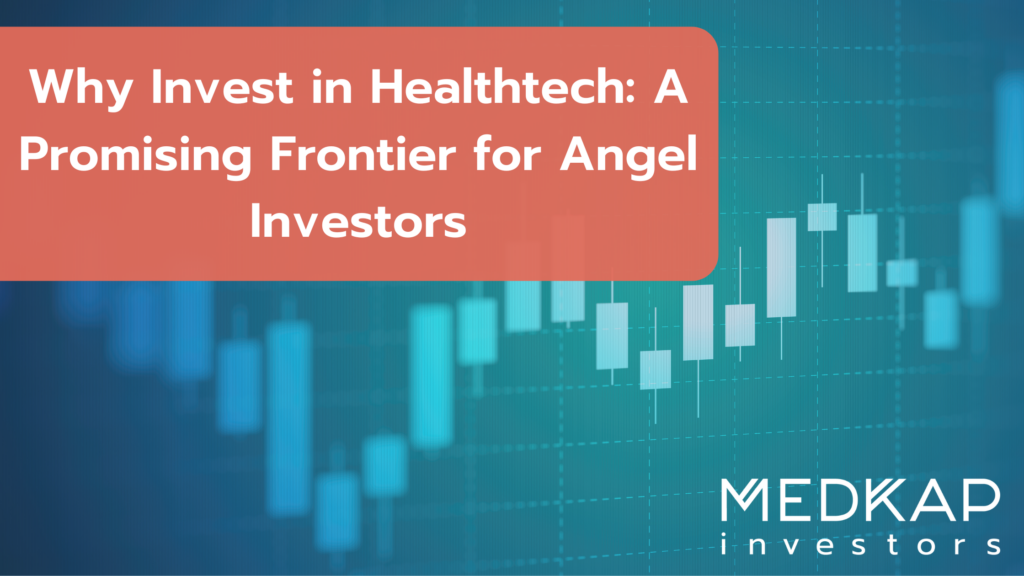Why Invest in Healthtech?
At the MEDKAP investor association, an angel investor club focused on healthtech, we are often asked about the potential of this dynamic sector. The convergence of healthcare and technology presents a unique opportunity for investors to make a significant impact while potentially reaping substantial returns. Here’s why healthtech should be on every angel investor’s radar.
The Booming Healthtech Market
The global digital health market is experiencing unprecedented growth. Valued at over $220 billion in 2022, it’s projected to quadruple by 2032, reaching an estimated $1,011 billion (1). This explosive growth is driven by technological advancements, changing patient expectations, and the pressing need for more efficient healthcare delivery systems.
Addressing Critical Healthcare Challenges
Healthtech companies are at the forefront of solving some of healthcare’s most pressing issues:
-
- Improving Access to Care: Telemedicine and remote monitoring technologies are breaking down geographical barriers, making healthcare more accessible to underserved populations. (2)
-
- Enhancing Efficiency: AI-powered diagnostic tools and workflow optimization solutions are helping healthcare providers do more with less, addressing the global healthcare worker shortage. (3)
-
- Personalizing Treatment: Genomics and precision medicine technologies are paving the way for tailored treatments, potentially improving patient outcomes while reducing healthcare costs. (4)
The Power of Data and AI
The healthtech sector is leveraging the power of big data and artificial intelligence to revolutionize healthcare delivery:
-
- Predictive Analytics: AI algorithms can predict disease outbreaks, identify at-risk patients, and suggest preventive measures, potentially saving lives and reducing healthcare costs. (5)
-
- Drug Discovery: AI is accelerating the drug discovery process, potentially bringing life-saving treatments to market faster and at lower costs. (6)
Regulatory Tailwinds
Governments worldwide are recognizing the potential of healthtech to address healthcare challenges:
-
- In the U.S., the FDA has streamlined its approval process for digital health products, creating a more favorable environment for innovation. (7)
-
- The European Union’s Medical Device Regulation (MDR) is setting clear guidelines for healthtech companies, providing a framework for growth and innovation. (8)
-
- Locally countries have launched their own digital health initiatives to foster quicker innovation since 2020.
Reimbursement
Digital Health Applications (DiGA) are reimbursed in Germany since 2020, which means doctors can prescribe them to patients like drugs. Other countries like Belgium, France, Austria have already followed and implemented or announced similar DTx initiatives.
Even with a streamlined market access, the right target indication and Go to Market strategy are key to achieving commercial success, and many of the DiGA manufacturers still struggle to develop and deploy a sustainable sales and marketing model.
Meanwhile, the consolidation of the DiGA Market has already started with significant exits (aidhere/zanadio and PINK acquired by Sidekick, Cara Care acquired by Mahana, Mementor/somnio acquired by Resmed, Kalmeda acquired by Pohl Boskamp, etc.) and company reorganizations.
Investment Opportunities Across the Spectrum
The healthtech sector offers diverse investment opportunities:
-
- Early-Stage Startups: Angel investors can get in on the ground floor of potentially disruptive technologies. This were MEDKAP is active in. (9)
The Impact of COVID-19
The pandemic has accelerated the adoption of healthtech solutions:
-
- Telemedicine usage surged, with many providers reporting a 50-175x increase in telehealth visits.
-
- Remote patient monitoring and digital health apps saw unprecedented growth, a trend likely to continue post-pandemic.
Challenges and Considerations
While the potential is immense, investors should be aware of the challenges:
-
- Regulatory hurdles can slow down product development and market entry.
-
- The need for clinical validation can extend timelines and increase costs.
-
- Privacy and data security concerns are paramount in healthcare.
Conclusion
The healthtech sector stands at the intersection of two of the most critical and dynamic industries: healthcare and technology. For angel investors, it offers the rare opportunity to potentially generate returns while contributing to meaningful improvements in global health outcomes. As we look to the future, healthtech is not just an investment opportunity – it’s a chance to be part of a transformation that could benefit millions of lives worldwide.
References
1. Fierce Healthcare, “Digital health market to quadruple by 2032 to $1T: report”
2. BNP Paribas, “Why invest in digital health?”
(https://investors-corner.bnpparibas-am.com/investing/why-invest-in-digital-health/ )
3. McKinsey & Company, “The era of exponential improvement in healthcare?”
4. Nature, “Realizing the promise of population-based molecular genetic studies”
(https://www.nature.com/articles/s41576-020-00262-w )
5. IBM, “The future of health is cognitive”
(https://www.ibm.com/watson/health/future-of-health-is-cognitive/ )
6. Nature, “Artificial intelligence in drug discovery: what is realistic, what are illusions?”
(https://www.nature.com/articles/s41573-019-0020-3 )
7. FDA, “Digital Health Innovation Action Plan”
8. European Commission, “Medical Devices Regulation”
(https://health.ec.europa.eu/system/files/2020-10/mdr_en_0.pdf )
9. CB Insights, “The Future Of Healthcare: Investment Trends & Startups To Watch”
(https://www.cbinsights.com/research/report/healthcare-trends-startups/ )
Further Reading
-
- Deloitte. “2024 Global Health Care Outlook.” Link
-
- BlackRock. “Global Healthcare Outlook.” Link
-
- Vector Medical Group. “What is the 2024 investment outlook for healthcare?” Link
-
- Galen Growth. “Q1 2024 Digital Health Insights: Unpacking Global Trends.” Link
-
- West Monroe. “Healthcare Investing Trends and Opportunities.” Link
-
- The Healthcare Technology Report. “The Top 25 Consumer HealthTech Companies of 2024.” Link
- Global Family Office Report 2024, UBS. Link
If you want to stay updated on Angel Investing in HealthTech at MEDKAP, please
- subscribe to our newsletter
- subscribe to our LinkedIn page.



